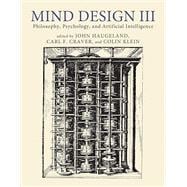In the quarter century since the publication of John Haugeland’s Mind Design II, computer scientists have hit many of their objectives for successful artificial intelligence. Computers beat chess grandmasters, driverless cars navigate streets, autonomous robots vacuum our homes, and ChatGPT answers existential queries in iambic pentameter on command. Engineering has made incredible strides. But have we made progress in understanding and building minds? Comprehensively updated by Carl Craver and Colin Klein to reflect the astonishing ubiquity of machine learning in modern life, Mind Design III offers an essential collection of classic and contemporary essays on the philosophical foundations and implications of artificial intelligence. Contributions from a diverse range of philosophers and computer scientists address the nature of computation, the nature of thought, and the question of whether computers can be made to think. With extensive new material reflecting the explosive growth and diversification of AI approaches, this classic reader equips students to assess the possibility of, and progress toward, building minds out of computers.
New edition highlights:
- New chapters on advances in deep neural networks, reinforcement learning, and causal learning
- New material on the complementary intersection of neuroscience and AI
- Organized thematically rather than chronologically
- Brand new introductions to each section that include suggestions for coursework and further reading








